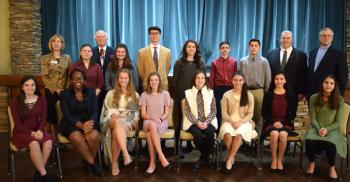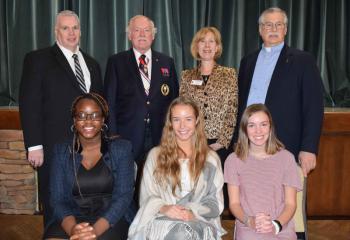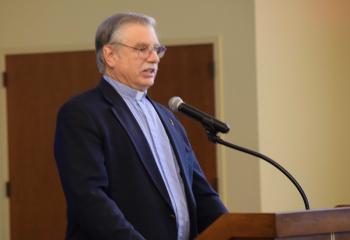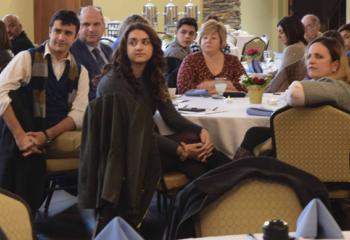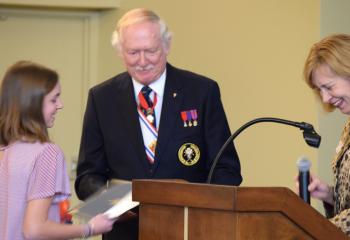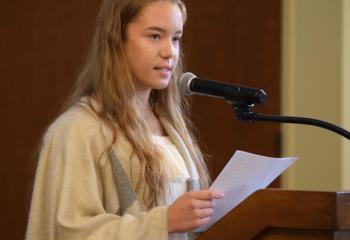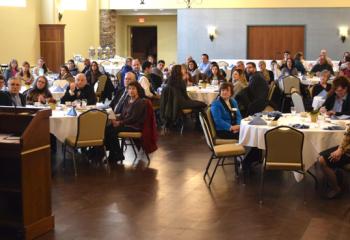By TARA CONNOLLY
Staff writer
“We need to remember that God is the author of life. The right to life is a controversy going on age after age, year after year, decade after decade, and century after century. It didn’t start with Roe vs. Wade,” said Father Andrew Torma, vocations director for the Missionaries of the Sacred Heart, U.S. Province, Jan. 13 to the finalists in the annual “Stand Up for
Life” essay contest award ceremony at St. Francis of Assisi, Allentown.
“Personal Choice, My Body, My Right” was this year’s Senior Division theme; “Every Life Cherished, Chosen, Sent” was the Junior Division theme.
The contest, a joint effort of the Knights of Columbus and the Diocesan Office of Pro-Life and Social Concerns, drew more than 600 submissions from students throughout the Diocese.
Father Torma, who is one of 11 children, told the students that there is no easy way to protect life and encouraged them to approach the controversy in a nonconfrontational manner.
“We are always going to have to remind someone along the line that life is precious. We need to grow in awareness and help others understand that life is a gift from God,” he said.
“This controversy is for the long haul. It will not go away in our lifetime. It is our responsibility and the responsibility of the Church to form consciences among our children that the right to life is ageless.”
Also offering remarks was Dr. Philip Fromuth, superintendent of Catholic education, and Mary Fran Hartigan, secretary of the Secretariat for Catholic Life and Evangelization, who lauded the students for the quality of their submissions.
“The quality of the essays and the thoughts contained within the essays provide us with so much hope that we may truly be a society that respects the dignity of all of God’s people,” said Fromuth.
He also noted that the “culture of life” is being threatened consistently and the value of human life is being challenged by an “a la carte” mentality regarding the moral teachings of the Church.
“As both faithful Catholics and citizens, it is our duty to help those in need and reach out to protect the lives of the most vulnerable in our society. Our voice must be heard as there are others who would seek to marginalize the most vulnerable and jeopardize the gift of life,” he said.
“So, for each of us, we pray our nation will embrace the values that have made us a great nation, a society that upholds the values of life, liberty and the pursuit of happiness for all. As people of faith, we must speak out on the attacks on our rights as citizens of this great country, for there should be no conflict in the United States by being faithful Catholics and responsible citizens.”
Hartigan, who read and judged the essays along with members of the Knights of Columbus and several other anonymous faithful, said each essay was impressive and foresees the pro-life movement growing stronger each day.
“I am hopeful with your generation that you can make a difference and transform hearts. I am hopeful that someday all people will recognize the dignity of the human person,” said Hartigan.
Winners for Senior Division (grades 9-12): first place, Elizabeth Lieb, Bethlehem Catholic High School (Becahi); Kelechi Onuoha, second place, Becahi.
Winners for the Junior Division (grades 7-8): first place, Emma Martinez, St. John Neumann Regional School, Slatington; second place, Helen Andreyo, St. Ignatius Loyola Regional School, Sinking Spring.
Honorable mention in the Senior Division: Thomas Biros, Berks Catholic High School (BCHS), Reading; Emily Carpenito, Nativity BVM High School, Pottsville; Emily Harclerode, Allentown Central Catholic High School (ACCHS); Madison Hayes, Nativity; Mason Wenrich, BCHS; and Natalia Yunez, ACCHS.
Honorable mention in the Junior Division: Bella Bartashus, Assumption BVM School, Pottsville; Sydney Brown, LaSalle Academy, Shillington; Cole Croslis, St. Thomas More School, Allentown; James Holzschuh, St. Jane Frances de Chantal School, Easton; Mason Ludlow, St. Jane School; Mercedes Martinez, St. Joseph the Worker School, Orefield;
Megan Matsko, St. John Neumann Regional School; and Hannah McGinley, St. Jerome Regional School, Tamaqua.
Elizabeth Lieb, Senior Division, First Place
Deliberately destroying or damaging the egg of a bald eagle in the United States can land a perpetrator in prison for up to a year or warrant the hefty fine of $5,000, under the Bald and Golden Eagle Protection Act of 1940 (U.S. Fish and Wildlife Service).
In Florida, the destruction of a single sea turtle egg necessitates a $100 fine and entails the possibility of jail time (Sea Turtle Conservancy).
Although the consequences may seem extreme, these pieces of legislation encounter no major opposition among American citizens. This is because both animal species are valued in their respective ways, whether it be for majesty or patriotic symbolism.
The laws in place to protect both species acknowledge two crucial facts – one, that something exists within those eggs that warrants enforced protection, and two, that the same something is not capable of protecting itself.
It is safe to assume that most people realize animals possess a lesser dignity and fewer rights than human beings. Logically then, one would expect the promise of human life to be protected to at least the same, if not a greater, extent. Yet it is legal in all 50 states to intentionally destroy an unborn human child, in some cases through the ninth month of a female’s pregnancy (National Abortion Federation).
This inconsistency is striking. Essentially, in the eyes of the law, a bald eagle egg is more valuable than a human fetus. An outsider might very well conclude that a committee of animals runs the government, as it seems to favor the rights of wildlife over those of the unborn.
If the government has a compelling interest to protect the lives of animals, how much more pressing is its responsibility to protect the very lives it governs over? The claim that abortion is too personal of an issue to warrant federal interference fails in consideration of the purpose of government.
The Founding Fathers established the government of the United States to, among other things, “promote the general welfare and secure the blessings of liberty” (Institute for Faith and Work). It is true that liberty and freedom are absolute until they infringe upon the rights of others.
In this way, abortion would be considered a personal freedom insofar as it did not significantly impede upon another’s right to live or pursue happiness.
Because it does involve intentional killing, abortion therefore falls under the umbrella of issues to be regulated by the national government. The deeply personal nature of abortion is not so personal after all, by virtue of the fact that it knowingly alters the fate of another person.
Pro-choice advocates may argue that the “other person” is really just an extension of the mother’s body and not an individual at all. Yet, if the fetus was actually part of the woman’s body, the two would share the same genetic code and blood type, which is simply not the case (U.S. National Library of Medicine).
Not only does science acknowledge mother and fetus as separate entities, the law does as well. Thirty-eight states enforce fetal homicide laws, and it remains illegal to execute a pregnant woman on death row because of the recognition that the fetus is a distinct human being (American Right to Life).
Like a baby eagle or sea turtle in an egg, a fetus within a female’s womb resides separately from the mother in an amniotic sac, which can almost be seen as a sort of human shell. Should human fetuses not be awarded the same protection as animal eggs, their lesser counterparts?
It is impossible to pinpoint the exact moment a bald eagle or sea turtle egg becomes viable, as this time period ranges from a few days to a couple of weeks (Hancock Wildlife Foundation). Nevertheless, the eggs are protected under law just the same, whether the embryo is on the path to viability or not.
With human fetuses, the transitioning from embryo to person, scientifically, is also difficult to pinpoint, although brain activity occurs as early as week four (National Institute for Biomedical Imaging). If animal eggs are protected even as mere yolks, why should human fetuses, which undergo legitimate neurological and cardiovascular activity, not be afforded the same liberty?
The timeline of viability is not as important as its inevitably; the logic should be to protect what will be, not necessarily what already is. A woman, like an animal, does not control the process of pregnancy, for it is comprised of intricate stages of development.
God, author of the human race, guides the growth of each human fetus. It is, ultimately, the will of God that brings new sons and daughters of Christ into the world. I believe that power is nontransferable.
Emma Martinez, First Place, Junior Division
How can I personally influence and build a culture of life in my parish, in my school, and among my family and friends? This is a question that children, teenagers and adults in our generation should ask themselves.
I believe that if we all accept every race, help the less fortunate, and provide an inclusive and comfortable environment for our schools and communities, our world would be a better place.
To get into more detail, racism is the prejudice, discrimination or antagonism directed against someone of a different race.
he race of a person should not be used as an advantage or a disadvantage when it comes to a job or a school application.
A person should never judge another human because of his or her race. You should learn more about them and get to know their personality before you judge them by their stereotype.
I believe we should acknowledge the fact that we are all human, and God made each and every one of us equal. He made us diverse and different to make our world a better place, not for us to judge each other by the color of our skin.
To help this issue we can participate in peaceful protests and learn about other cultures. If the world takes the time to accept all people and think of everyone with equality, we will have a more complete and unified human race.
To influence and build a culture of life in my parish, I can organize a food drive or donate my own money to people who are less fortunate then I. Also, clothing and shoes that do not fit anymore can be donated.
During the winter I can ask my parish council about taking a less fortunate person in and giving them a home for a few weeks. In that time I could ask other parishioners to donate their time and supplies to help the people that are staying at the parish.
Also, if there are less fortunate children in my parish, I could make sure they have a breakfast, some toys and books throughout the year. I believe if parishes throughout the nation all exchange ideas about how we can help the less fortunate and homeless, we can spread the culture of life throughout the world.
In our schools I believe that if we spread an inclusive and pro-life culture, our generation will grow with kindness and respect for all people, races and religions. Students can build a culture full of life throughout their school by making everyone feel welcome.
When a new student comes to a school they should always be welcomed with a kind “hello,” just so they feel comfortable and noticed. No matter what they look like or what they are wearing, students of all ages should invite the “new kid” to their table, as well as anyone who is sitting by themselves. Sometimes all a person needs is a little kindness to feel loved and wanted.
When someone in my school ever looks lonely I should take the initiative to invite them over and have a conversation with them. Not everyone is always going to be just like you. Not everyone will have the same interests as you, but if everyone is treated with equal kindness and respect, the school community will be a better environment.
If these three points are taken to heart and acted on, I believe that our world will be a better place where we can spread the Good News and a pro-life culture.



